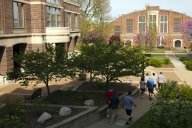You have /5 articles left.
Sign up for a free account or log in.
One recurring feature of the student protests that have recently swept across college campuses is lists of demands -- for new faculty slots, new presidents, "safe spaces" and more inclusive campuses, just to name a few. As the lists have grown longer and more ambitious, responses from administrations have varied.
Add to the list Western Washington University, a public university with about 15,000 students. Late last year, Western made the news after the president called off classes in light of anonymous threats sent via the social media app Yik Yak. Now a student group there calling itself the Student Assembly for Power and Liberation has sent a list of far-reaching demands to the university’s president after criticizing the administration for an inadequate response to threats.
The list comprises some of the most of the most expansive -- and resource heavy -- demands put to a university’s administration. Among them:
- A new College of Power and Liberation to focus on “the study of histories and communities that continue to be mis- and underrepresented into the mainstream curriculum at Western.” In addition to the college itself, the list calls for “a cluster hire of 10 tenure-track faculty,” a new building to house the college and that the Student Assembly for Power and Liberation have “direct input and decision-making power over the hiring of faculty for the college.”
- That $45,000 be allocated to compensate students and faculty “doing de-colonial work on campus,” which is defined as “providing space and resources to learn alternate histories, supporting students' nonacademic work, emotional and intellectual labor that is not about publishing or service to the institution, providing often unrecognized trainings, workshops and/or interventions on behalf of students.”
- The creation of a 15-person student committee called the Office for Social Transformation “to monitor, document and archive all racist, antiblack, transphobic, cissexist, misogynistic, ableist, homophobic, Islamophobic and otherwise oppressive behavior on campus.” Using a three-strike system, the committee would have the power to take disciplinary action up to and including dismissal against faculty members who receive citations for creating “an unsafe classroom environment.”
- A mandatory online survey conducted by the faculty and administration that would “allow Western Washington University community members to confidentially express concerns of discrimination and safety.”
- A new “multicultural residence building,” applications to which would be overseen by the new Office for Social Transformation.
- And finally that the university provide tuition reimbursement to “any Western Washington University student who has been targeted by, harassed by or has experienced excruciating acts of violence that [were] racialized, sexualized, gendered, based on ability, employment status, citizenship and/or mental health from the university.”
The petition also included several uses of the words "persxn" and "hxstory," which some online were quick to mock. Replacing certain letters in pronouns or some other words (like "Latinx" for Latino or Latina) with an X is strategy to avoid gendered language. Changing other words, like "person" and "history," in that way does not appear to be a very common at all, however: neither "hxstory" nor "persxn" have been used often enough to be graphable by Google Trends.
Western Washington University’s president, Bruce Shepard, responded last week in an email referring the demands to the university’s student government, the Associated Students Board of Directors.
“The proposal brings out-of-the-box thoughtfulness to subjects of vital importance to Western,” Shepard’s email read in part, but it “is problematic … because Western works bottom up, not top down. Support, understandings and alliances must be built working bottom up. No president can simply command such developments as those contained in the proposal.”
Additionally, he wrote, “The proposal would fundamentally contradict our policies, practices, mutually bargained contracts, and federal law and policy on such matters as faculty evaluation and discipline, student conduct and discipline, the investigation of alleged racist behaviors, and the planning of facilities, spaces and residence halls. I further find, in the proposal, language possibly threatening our core commitments to campuswide inclusivity and, again possibly, to academic freedom. The proposal is also problematic, for it would have large budgetary impacts but is missing a critical component of any complete proposal; namely, a credible approach for funding.”
Shepard left the decision about how to handle the demands up to the Faculty Senate and student government. The student government did not return emails requesting comment, but Molly Ware, president of the Faculty Senate, said its executive council would be discussing how to proceed at an upcoming meeting and declined to comment further.
"We are disappointed at the response we have seen from President Bruce Shepard," the Student Assembly for Power and Liberation said in an email to Inside Higher Ed, because he copied the group on an email rather than responding directly, which the group felt meant the president "was clearly denying open communication with us," and because "historically the needs of marginalized students have effectively been ignored under the guise of roundabout, bureaucratic modes of change."
"We believe it’s the responsibility of admin and faculty to find the necessary funding. If they can find the funding for a brand-new athletics gym to boost their recruitment rates, they can find the funding to support their most vulnerable students," the group said in response to the president's note that their proposals lacked a plan for funding. And as for their legality: "We recognize that some of the demands seem out of the bounds of current possibility and legislation. However, we also recognize that the current political, legal and social conditions that we are in use federal, state and campus legislation to enforce systems of oppression that disproportionately set students of marginalized identities up for failure and exploitation …. To see the fruition of the demands that we have brought forward, it is necessary for us to push away from the existing frameworks."
"These demands are not coming out of nowhere, nor are they too ambitious," the group said. "These demands come out of experiences of students in the past and present, and are the baseline necessities in fostering a real education."








